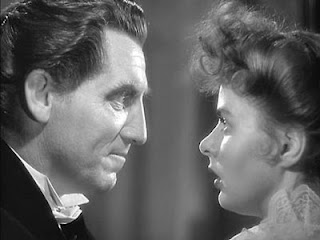 |
| (Samuel Beckett at a Paris bistro.) |
When I was young, I identified with every Neil Simon guffaw at the human condition. Yet I was blissfully oblivious to what I thought was every humorless Samuel Beckett observation concerning the ennui that envelopes our lives. Over the decades, a frightening transformation has occurred: Simon's wry comedy has shrunk, while Beckett's clowns "astride the grave" have become massively pertinent and, yes, even morbidly hilarious, as if they were Laurel & Hardy on downers.
Anyone who's ever gotten above a B in Intro to Theater class knows that the Irish, particularly Beckett, are theater's great Yoricks, showing us our foibles and mortality, while amusing and bemusing us with the tinkle of jester bells. "Waiting for Godot" is, in all probability, the most influential and revered play of the second half of the 20th century not written by Eugene O'Neil or Tennessee Williams. One way to regard Beckett's genius is to view him as the polar opposite of Wagner. Whereas the German myth maker utilized his transcendent music to create a massive world of conflicted gods, Beckett employs his bleak poetry to summon a godless universe of parched humans seeking nourishment and meaning in a landscape devoid of illumination.
Beckett's "Endgame," which is receiving a vibrant production at the Cleveland Play House presented by the Cleveland Museum of Art, proves itself to be a weak cousin to the fabled "Godot." In spite of Massoud Saidpour's stately direction and an exceptionally gifted cast, it doesn't take a Sherlock Holmes to detect that the play is a painful 90 minutes with a brilliant 20 minutes buried inside. In Beckett tradition, it is set in a dismal, post-apocalyptic world equipped with archetypal masochistic servant and master and, in a corner in two garbage cans, the master's cast-off, aged parents. To give a whiff of its dark humor, we only have to mention that its master and servant are named Hamm and Clov. Hamm's decaying parents are Nagg and Nell.
The action is confined to Hamm periodically calling out for his pain killer and Nagg and Nell occasionally popping out of their individual cans to ask for a biscuit and to break into tears, which inspires Hamm's observation: "Nothing is as funny as unhappiness." Despite its brilliant writing, there is no dramatic progression, and even though it may get this writer sentenced to literary purgatory, we have to declare that this Beckett work makes one yearn for the same medication that Hamm lusts after. To illustrate the point, the aged professor of literature sitting to my right moaned that he would rather be watching "Lassie Come Home."
 |
| (Dorothy Silver as Nell in Beckett’s "Endgame." Photo by Peter Jennings, courtesy the Cleveland Museum of Art.) |
Perhaps no writer so defined our post-war blues as Samuel Beckett. Even his flawed music deserves our consideration.
"Endgame" plays until Saturday, June 11. For tickets, call 216-421-7350.







